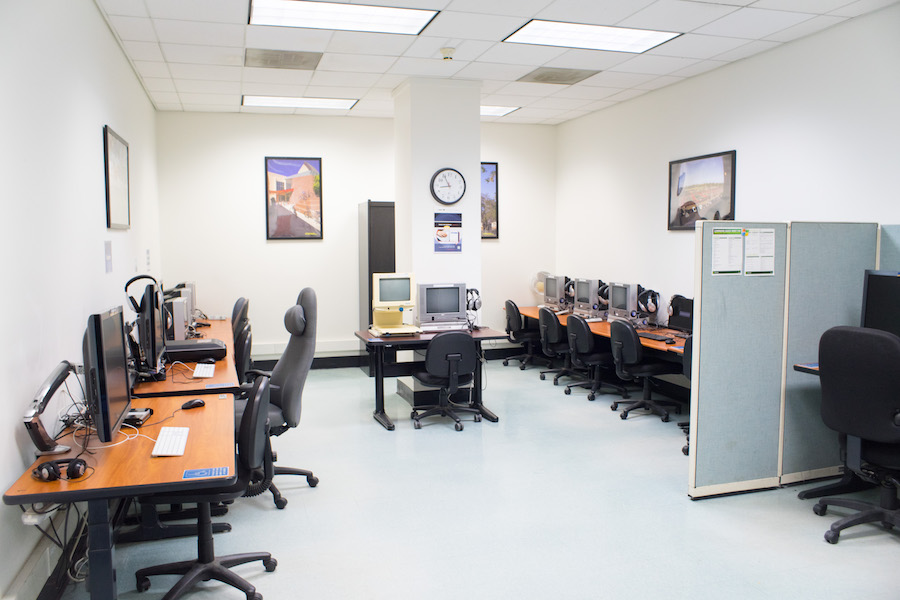
Making accessibility, accommodations for employees with disabilities a norm on campus
From top-of-the-line voice recognition software to tables that height-adjust depending on load weight, UC Davis’ accommodations for employees with occupational and cognitive disabilities are becoming increasingly ubiquitous. However, many issues still persist.
Tim Kerbavas, the special event support technical director for UC Davis’ Academic Technology Services, was working at an event when he fell off a stage and sprained his ankle. Coming back an hour later in crutches, he started to consider the circumstances those with disabilities face daily.
“The aisles are too narrow and I can’t get past the chairs,” Kerbavaz said. “I came back with a temporary disability and realized I [couldn’t] get around this event that I’m running. It was this wake-up call, like, ‘I am contributing to all these events.’ I’m a part of the problem here.”
Those without disabilities often find it difficult to identify the widespread lack of accessibility across campus and the daily problems it causes for those with disabilities. Kerbavas spoke at UC Davis’ fourth annual Global Accessibility Awareness Day (GAAD) on Thursday, May 18 among other concerned UC Davis faculty and staff working to engage with more accessible university practices.
Many GAAD speakers emphasized how accessibility improvements help not only those with disabilities, but the entire population as a whole. The application of a concept called universal design accomplishes this.
“We would like more instructors, faculty and [teaching assistants] to be aware of these principles and to be applying them,” said Dr. Cara Harwood-Theisen, an education specialist at UC Davis’ Center for Educational Effectiveness.
Universal design encapsulates the idea of access for all, anticipating the needs of a wide range of potential individuals by considering factors such as height, reading skill and auditory and visual capabilities.
“Rather than designing experiences with the average user in mind, we consider what we know as a diverse population and their needs,” Harwood-Theisen said.
While California’s population of working-age individuals with disabilities is the largest in the country, California’s total number of individuals with disabilities is 42nd nationally. Disabilities are often not congenital and instead are acquired through work and aging among the common population.
“It’s one thing that will hit all of us at some point — as we get older, the more disabilities we’ll have,” said Joshua Hori, an accessible technology analyst for UC Davis’ Student Disability Center. “I didn’t have tinnitus when I was younger. I didn’t have anxiety when I was young. As the environment changes, so will your disabilities.”
Though widely varying depending on type of work, UC Davis’ departments have set practices to anticipate, prevent and accommodate injuries and disabilities. All of its delivery and mail staff have lift gates and hand trucks to carry heavy items. Faculty and staff with offices choose from three types of chairs and endless combinations of keyboard, monitor and desk configurations, as office work can often result in repetitive motion injuries.
“We spend a lot of time coaching and training supervisors so that they understand [disabilities] law,” said Dave Ritz, a vocational rehabilitation counselor for UC Davis’ Disabilities Management Services. “We have developed partnerships and case coordination meetings monthly with large departments so that we’re able to do on-the-spot training, talk about cases [and] talk about accommodations.”
Ritz explained the organic conversation an individual with an injury or disabilities can have with their employer to receive effective job accommodations through the American Disabilities Act of 1990-mandated Interactive Process.
“The Interactive Process is a good-faith conversation with an employee about what we can do to help you,” Ritz said. “There’s no right words, there’s no wrong words, there’s no buzzwords, there is no step A, step B, step C.”
Supervisors engage in the Interactive Process with their employees to assess their limitations, often review a medical note and determine the best way to make accommodations. Employees’ precise disabilities remain confidential and usually are not disclosed at all.
With some resources and creativity, UC Davis employers usually make accommodations with no loss to any party and rarely find providing accommodations unattainable.
“For example, we have some custodians that have bad knees.” Ritz said. “We let [them] use the elevator. Now, that person can’t clean the stairwell and so they have to clean more bathrooms or vacuum more and somebody else is going to clean the stairwell. […] That’s why we can make accommodations for everything if we try to think about it.”
Especially when compared to other employers, UC Davis offers a variety of solutions for employees with disabilities.
“I’ve never had [this support] anywhere else,” Hori said. “Here, I have a slew of options. PG&E, Wells Fargo, […and] even on military bases — nope, nothing.”
With new accessibility technology created every year and several university units dedicated to implementing them, the percentage of UC Davis’ population helped by disability services has tripled since 2007 to 4.4 percent, according to Ritz.
However, many of UC Davis’ employees do not report their disabilities or have not been reached by the services. Accessibility still has much room for improvement.
“I feel bad touting [campus accessibility] like a good thing because we should have been doing this forever,” Kerbavaz said. “How do we fix these things before it affects […] an attendee or presenter’s ability to be a part of an event?”
Despite lack of complete accessibility, UC Davis recognizes disabilities as part of campus diversity and accessibility as part of social equity. In the past, and even presently, many institutions have not.
“Being told you can’t fly, you can’t do this, you can’t do that,” Hori said. “There’s going to be somebody who’s going to prove you wrong. We have a blind optometrist here. We have a deaf music professor here.”
Ritz said that while supervisors on an individual level readily make accommodations for staff with disabilities, fear of lawsuits under disabilities law historically has driven much of the systematic change toward universal accessibility in colleges.
Written by: Kristen Leung — features@theaggie.org



